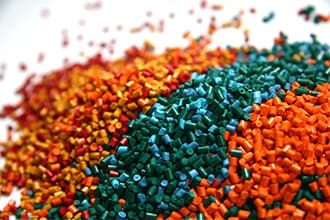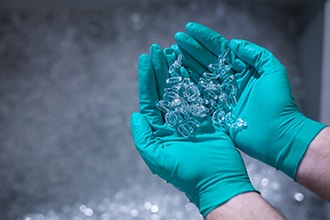Sorting / Collection
Plastics
Plastic is a kind of material made of polymer compounds. Plastics and polymers are widely used in various products that play an important role in our daily life. In order to develop new products, chemical and physical properties like heat dependent characteristics and degradation paths need to be investigated using various analytical instruments. In recent years, due to growing concerns about the environment, regulations have been imposed on certain chemical compounds that have the potential to harm the environment like RoHS, while there has also been a shift to actively recycle other chemical products like plastics, making it even more important to understand the properties of resins and plastics.

Various measures to recycle plastics have been implemented in recent years in response to growing interest in establishing a carbon-free and recycling-oriented society. With Japan’s enactment of the Containers and Packaging Recycling Law, established to reduce waste and promote reuse, and the Law for Recycling Plastic Materials, established to promote recycling, we have been seeing more and more recycled plastic products. Such products involve sorting, pulverizing, washing, drying, and otherwise processing collected plastic waste to recycle and reuse the material again as new products.
Known plastic recycling methods include “material recycling,” which uses waste plastic directly in the form of plastic as a raw material for reuse in new products, and “chemical recycling,” which chemically decomposes waste plastic for reuse as a raw material in new products. The following describes product applications used for plastic recycling processes.
-
-
Pelletization / Monomerization
-
Mechanical Properties
-
-
Impurity measurement
-
-
-
-
Analyzing Regulated Substances
-
-
Analyzing Physical Properties

Plastics are manufactured using a wide variety of processes. To ensure appropriate manufacturing parameters are specified for each process, manufacturers need to understand the status of each material. For plastics, the material status varies for each manufacturing process and establishes which material properties need to be determined.

Failure analysis is essential for increasing product reliability. Clues for quality improvements can only be obtained by identifying aspects that do not satisfy performance requirements and then determining the causes of failures.







